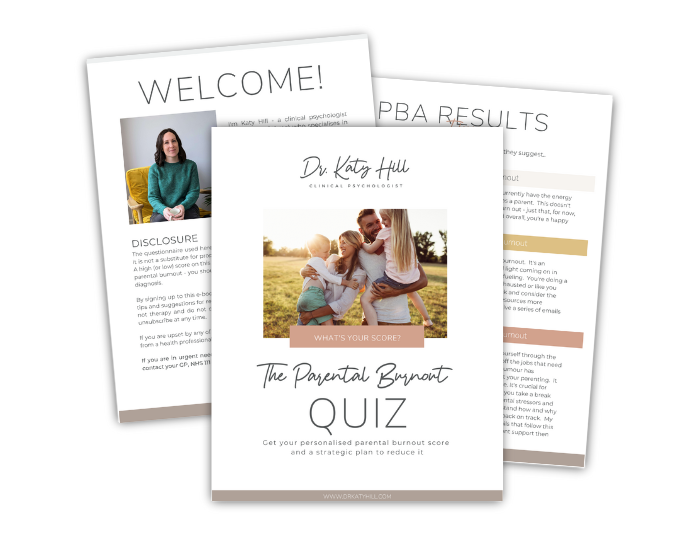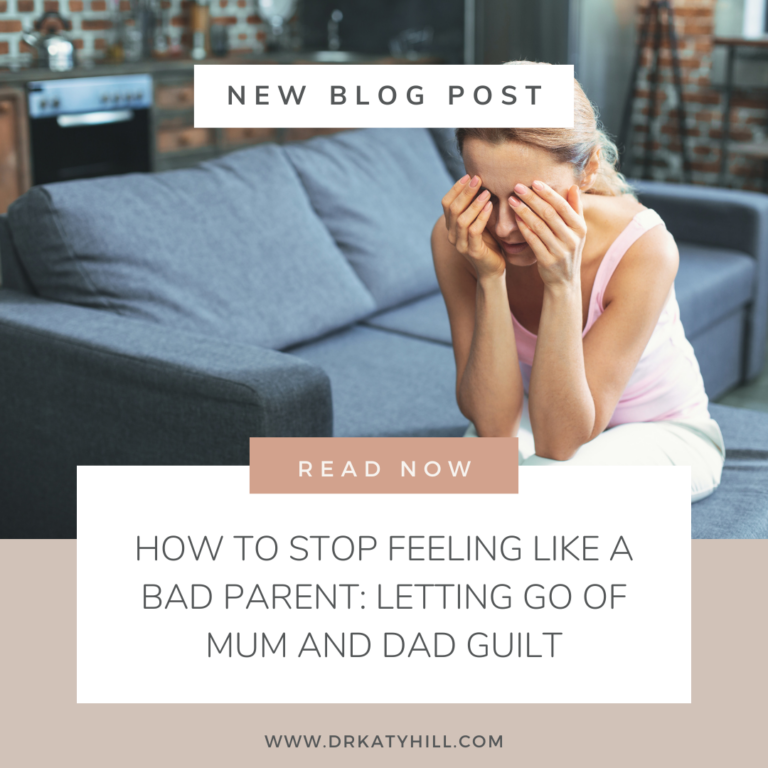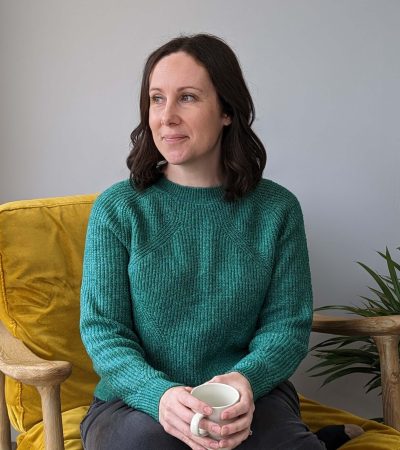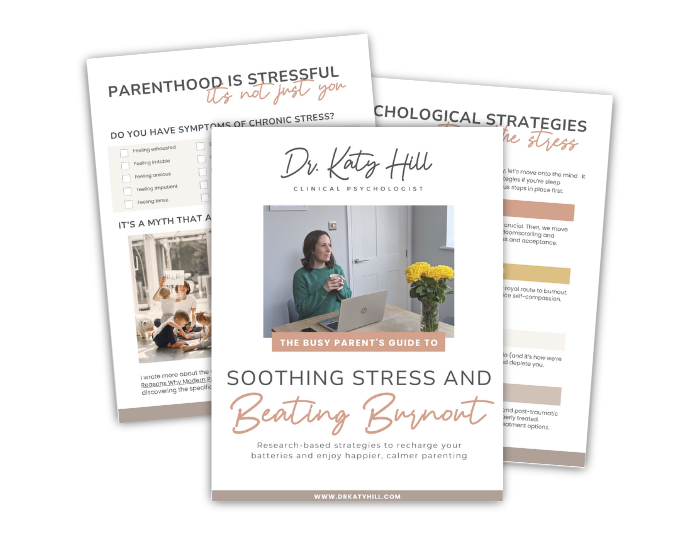Do you ever feel like a bad parent? Maybe you lost your patience, forgot something important to your child, or just don’t feel as present as you’d like to be. Parenting guilt – sometimes called “mum guilt” or “dad guilt” – is incredibly common, but that doesn’t make it any easier to deal with.
As a clinical psychologist who specialises in therapy for stressed parents, I hear these concerns all the time. Parents tell me things like, “I feel like I’m failing my child.” or “I’m worried I’m traumatising them.” These thoughts often stem from comparison, fear of making mistakes, and the impossible standards we set for ourselves.
Social media fuels these feelings, showing us carefully curated images of parents who seem endlessly patient and engaged. Meanwhile, we’re bombarded with conflicting parenting advice, leaving us questioning whether we’re doing enough or doing it ‘right’.
But no parent gets it right all the time, and that’s OK.
Parenting isn’t about perfection. It’s about connection, repair, and showing up as best as you can. This article will help you:
- Understand the difference between guilt and shame
- Recognise which parenting mistakes need repair (and which don’t)
- Let go of unrealistic expectations and self-criticism
- Learn how to forgive yourself as a parent and move forward with confidence
not everything you feel guilty about is an actual problem
This is a really important place to start: Not everything you feel guilty about is an actual problem.
Many of my clients tell me they’ve been beating themselves up over things that are simply part of being a human parent – feeling bored by pretend play, handing over the iPad for a bit of peace, needing time alone, or sending their child to school with an ordinary lunchbox rather than a Pinterest-worthy bento masterpiece.
Many parents – especially those who are conscientious, high-achieving, or prone to overthinking – are being held back by perfectionism. They hold themselves to impossibly high standards, believing that they should be endlessly patient, present, or playful.
It’s normal to want to give our children the best possible start in life, but – and I say this with love -many modern parents could loosen up a little bit.
Some guilt is misplaced, driven by unrealistic expectations rather than any actual harm done. Other times, guilt serves an important function. It tells us when we’ve acted in a way that doesn’t align with the kind of parent we want to be. The key is learning to differentiate between the two.
is this actual guilt, or is it shame?
Another important distinction I’d like you to make is between guilt and shame. Often, when I talk to clients about their guilt, it quickly becomes clear that they’re actually talking about shame.
Guilt is about behaviour – it says, “I did something bad.”
Shame is about identity – it says, “I am a bad parent.”
While guilt can be helpful – it can motivate us to right our wrongs – shame is always unhelpful.
Shame tells us that we’re fundamentally flawed rather than just simply human. It convinces us that what we’ve done is an indication of our badness rather than a misstep. This inner monologue doesn’t really encourage us to repair – it traps us in self-judgment, heightens stress, and prompts us to withdraw from others.
We instinctively know that shame isn’t helpful. We don’t want to shame our children, or allow teachers to use shame in their classrooms. And we don’t use it with our friends.
If your best friend was struggling with a parenting mistake, would you tell them that they’ve failed, that they’ve messed their kid up, or that they’re a bad parent?
Of course not. You’d likely be moved to reassure and encourage them. I’m going to suggest that you practice doing the same with yourself.
Some parents I speak with worry about the idea of offering themselves the same compassion they offer others. They’ll say things like, “But I did something awful and I shouldn’t be let off the hook.”
Again, that’s not something they’d say to their best friend. But also, research shows that people who are more self-compassionate are actually more likely take responsibility and make amends. Shame makes us withdraw and hide, whereas self-compassion gives us the space and courage to repair.

The Parental Burnout Quiz
Curious what your own parental burnout score is? Download the free assessment and get your score – plus expert tips on how to reduce it.
how to make a repair
Maybe you’ve heard the term ‘rupture and repair’ – it’s a long-standing concept in psychotherapy. The idea is that great relationships aren’t defined by a lack of conflict (rupture), but by how we make amends and recover from it (repair).
Many of us were not raised by parents who modelled rupture and repair. It simply wasn’t part of the parenting culture back then. Many older adults don’t know how to apologise for their mistakes, because it was never modelled to them either. So, if this feels unfamiliar to you, that’s okay; it’s a skill you can learn.
A simple repair process could involve:
1) Acknowledge what happened e.g. “I’m sorry I yelled at you when we were rushing and I was worried about being late for school again.”
2) Validate their feelings e.g. “I imagine that felt scary.”
3) Take responsibility e.g. “I should have taken a deep breath first, and I wish I had.”
4) Reassure and reconnect e.g. “I love you, and I’m working on staying calm even when I feel frustrated. And I’m going to make sure we start getting ready for school earlier tomorrow so there’s not so much of a rush.”
Keep it simple.
- Don’t over-explain.
- Don’t shift the blame (“If you would listen, I wouldn’t act like this.”)
- Don’t lay it on thick, making your child feel like they need to take care of you (“I feel so awful, I’m such a bad mum.”)
If there’s space, you might offer a quick activity you could do together; then move on.
final thoughts
Parenting is a journey, not a test. A relationship, not an exam to pass.
Your child doesn’t need you to be perfect. They need you to be present, to love them, and to be willing to repair when things go wrong.
Let go of the idea of the ‘perfect parent’. Limit your exposure to the comparison and judgment of social media. Step away from the phone and make real connections with real parents – you’ll soon see that no one gets it right all the time, and that’s OK.
Having friends who are parents can be an absolute lifeline both in terms of practical and emotional support.
But maybe you feel like you need to speak to someone outside of your social circle; someone who gets it both as a professional and as a parent themselves.
If so, I can help.
I specialise in online therapy for parents struggling with the difficult thoughts and feelings that are part and parcel of parenthood. Guilt comes up all the time in my sessions with clients, and I can help you work through it with more self-compassion, so that you can parent with more confidence and joy.
Click here to book a free intro call with me
You don’t have to do this alone.
need more help managing stress?
If you’re looking for more support, check out my free eBook, The Busy Parent’s Guide to Soothing Stress and Beating Burnout. It’s full of practical, evidence-based strategies to help you navigate the challenges of parenting with less stress and more balance.








